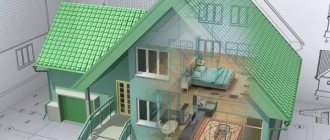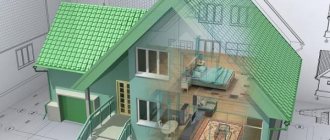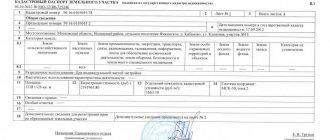Is it possible to legalize construction on your own plot and on municipal land?
Legalizing unauthorized construction in 2021 through the court is a promising solution if:
- the developer has the right to build on this land plot (for example, he owns the land or has leased it for construction);
- the construction does not violate construction and urban planning standards;
- it is safe and does not violate the rights of other persons (for example, the owners of a neighboring plot, the holder of an easement on a plot under an unauthorized building).
All these conditions must be met simultaneously. If at least one of them is violated, then you should first eliminate the violation, and only then go to court (clause 3 of Article 222 of the Civil Code of the Russian Federation).
What is recognized as self-construction
According to legislative provisions, unauthorized construction includes various options for buildings that, for various reasons, are not coordinated with the administrative structures of the locality within which they are located.
It is quite easy to recognize what self-building is. There are a number of characteristics characteristic of self-built objects:
- The facility was built on land that was not properly registered as the property of the owner.
- The construction project appeared on a site whose intended purpose did not imply this use option.
- A house or other structure was built, bypassing the approval of various administrative structures.
- The construction of the facility occurs in violation of urban planning standards and other requirements (for example, fire safety), as a result of which it was not possible to obtain development approval.
Any of these options is a serious reason to worry about the future ownership and right to dispose of property. The faster the issue of illegal building on a private plot is resolved, the fewer problems await the owner.
Additional approvals
Additional approvals are required if the premises have been redeveloped or reconstructed after construction.
To do this, you need to send a request to the appropriate authorities in order to receive notification of redevelopment/reconstruction.
There have also been changes in legislation. If previously it was enough to attach a sketch to the technical plan and obtain permission, now before issuing the paper, a commission must visit the site. She draws up and signs a certificate of compliance, and only after that the person receives title documents.
Another innovation: if previously redevelopment in a new house could be carried out only after the property was registered in the cadastral register, now these processes can be combined, which significantly reduces the time.
The approval process is quite complicated - you need to put in a lot of effort and spend a lot of time going through the authorities.
Often modern people simply do not have time for this. We, the experts, will help you: we will take care of creating a registration certificate, collect all the necessary certificates and approvals for you, collect a full package of documents, and so on.
Official website of the Supreme Court of the Russian Federation
09:30 01/17/2018 The fact of the loss of archival documents for the old house and the lack of information about the circumstances of its construction do not give the authorities the right to recognize the building as an unauthorized construction and refuse to register it. In the case of long-term open and bona fide ownership of real estate, the owner acquires ownership of the property, reminds the Supreme Court (SC) of the Russian Federation.
The highest authority considered the complaint of a resident of Novosibirsk, who lived for 20 years in a residential building built back in 1949, and when she wanted to rent the land under it, the authorities found out that the building was a self-construction and could not be put into operation. The courts supported the officials' position.
However, the Supreme Court of the Russian Federation noted that in the absence of title documents for ancient buildings, its owners can refer to acquisitive prescription and, on its basis, demand registration of property. The absence of claims from the authorities and the compliance of the house with all the necessary technical parameters should also be considered an argument in favor of the owner of the house, the court points out.
The essence of the dispute
The courts found that the controversial residential building on Dekabristov Street was built back in 1949, and extensions were added to it in 1954, 1971, 1978, 1980, 2006, 2010. The owners of the house, according to technical registration and technical inventory, were two owners, who on April 1, 1977 sold it to the plaintiff’s mother for 3 thousand rubles, for which there is a corresponding receipt.
From the house register extract it follows that the mother was registered at the address of this house since April 1977, and the applicant - since November 1996. When the plaintiff's mother died, she took over the inheritance.
In the summer of 2021, the woman asked the Department of Land and Property Relations of the Novosibirsk City Hall to provide her with a plot of land under the house on terms of purchase or lease. And then it turned out that there were no documents for the house and it was, in fact, a self-built building.
The answer came from the Novosibirsk City Archives that in the documents available for storage for 1946–1957, the decision on the allocation of a land plot and the registration of housing construction located on Dekabristov Street was not found.
The authorities came to the conclusion that the land plot under the house cannot be formed and provided, since there is no title document for the residential building itself. In the fall, the administration refused to allow the plaintiff to put the house into operation. Then she turned to the court to protect her rights, but even that did not support her.
Refusing to satisfy the claims, the courts of the first and appellate instances came to the conclusion that the disputed residential building is an unauthorized construction, the land plot on which the residential building is located has not been formed and not registered in the cadastral register, and has not been provided to the plaintiff with any right, and therefore there are no grounds for recognizing the right of ownership of an unauthorized construction due to paragraph 3 of Article 222 of the Civil Code of the Russian Federation.
The right to self-build
The Supreme Court recalled that ownership of an unauthorized construction can be recognized if the following conditions are simultaneously met:
- if in relation to the land plot the person who carried out the construction has rights allowing the construction of this object on it;
- if on the day of going to court the building complies with the parameters established by the territory planning documentation, land use and development rules or mandatory requirements for building parameters contained in other documents;
- if the preservation of the building does not violate the rights and legally protected interests of other persons and does not create a threat to the life and health of citizens.
In this case, the person whose ownership of the building has been recognized shall reimburse the person who carried out the construction costs, the amount of which will be determined by the court, as specified in the ruling.
Acquisitive prescription
An important factor in such cases is acquisitive prescription, which the Supreme Court analyzed in detail.
The court recalled that if a citizen is not the owner of real estate, but in good faith, openly and continuously owned it as his own for 15 years, then he acquires the right of ownership of this property (acquisitive prescription - part 1 of Article 234 of the Civil Code of the Russian Federation).
At the same time, the effect of Article 234 of the Civil Code also applies to cases where ownership of property began before January 1, 1995 and continues at the time of entry into force of part one of the code, the Supreme Court points out.
Possession by prescription is bona fide and open if the citizen did not know and should not have known about the absence of a basis for the emergence of his ownership right, but at the same time did not hide the fact that the property was in his possession, the court notes with reference to the decisions of the plenum of the Supreme Court No. 10 and the Supreme Court Arbitration Court No. 22 dated April 29, 2010.
The decision also states that, within the meaning of Articles 225 and 234 of the Civil Code, the right of ownership by virtue of acquisitive prescription can be obtained both for property belonging to another person and for an ownerless thing.
The possibility of filing a claim in court for recognition of property rights due to acquisitive prescription follows from Articles 11 and 12 of the Civil Code of the Russian Federation. Therefore, a person who believes that he has become the owner of property due to acquisitive prescription has the right to apply to the court with a claim for recognition of his ownership rights, the court reminds.
“In the meaning of the specified provisions of the law and the explanations of the plenum, possession by prescription is considered in good faith if, when acquiring a thing, the person did not know and should not have known about the illegality of taking possession of it. This applies to cases where a thing is acquired by externally lawful actions, but ownership rights cannot arise due to certain circumstances. In this case, a person owns a thing openly, as if it were his own, that is, instead of the owner, without any legal basis (title),” the Supreme Court summarizes.
The position of the Supreme Court on the case
According to the case materials, the plaintiff and her mother openly, continuously and conscientiously used the residential building for almost 40 years and bore the burden of the costs of its maintenance.
During all this time, no one, including the local administration, disputed ownership of either the house or the land underneath it. There were also no demands for the demolition of the house or its gratuitous seizure or the reclaiming of land.
At the same time, according to the technical conclusion, the residential building complies with fire safety standards, its building structures do not pose a danger to human life and health, the residential premises meet sanitary and epidemiological requirements, load-bearing and enclosing structures are in working condition.
Meanwhile, these circumstances were not the subject of study and assessment by the courts, who believed that they had no legal significance for considering the dispute that arose, the Supreme Court points out.
“However, we cannot agree with this conclusion, since the mere absence in the archival fund of documents on the allocation of a land plot, as well as the inability to prove ownership on the basis of a properly concluded and registered agreement, does not prevent the acquisition of real estate by prescription, the circumstances of the construction of which are unknown.
A different approach would limit the application of Article 234 of the Civil Code of the Russian Federation and the introduction into civil circulation of real estate erected during the period of civil legislation that did not provide for the recognition of ownership rights to unauthorized construction, and in respect of which the deadlines for submitting demands for demolition have expired,” the definition notes.
Taking into account these circumstances, the Supreme Court overturned the decision of the appellate court and sent the case for a new trial from this stage.
“When considering the case again, the court should take into account the above, establish the circumstances relevant to the consideration of the case, the legal relationship of the parties and resolve the dispute that has arisen in accordance with the requirements of the law,” the RF Supreme Court noted.
Expert commentary
The Supreme Court considered the dispute when the case was not in self-construction at all, but in a different everyday situation, when documents for the construction of a house were not preserved, as well as documents for land allotment, but the owners of such real estate openly, continuously and conscientiously exercise their rights (own and use) their property for many years, including a change of owner through inheritance and other forms of succession, explains Managing Partner of Tarlo and Partners Alexey Popov.
According to him, in this case there is only one sign of unauthorized construction - the absence of a title document.
“So, in the dispute under consideration and similar cases, the court stated that the fact of the loss of archival documents and the unknown circumstances of the construction, provided that the construction was old and the open bona fide possession continued for more than 15 years, cannot be grounds for refusing to register ownership of the house and land. The court also identified the absence of claims from the state for the use of such real estate, or demands for the demolition of such a house as an unauthorized construction, as circumstances speaking in favor of the owner. Based on the totality of such circumstances identified in this dispute, the owner cannot be accused of illegal construction at all, i.e. classify his house as an unauthorized construction, and accordingly, there are no grounds for refusing to formalize his property rights under the current legislation and limit his other rights as an owner,” Popov emphasized.
Alice Fox
Simplified procedure
When talking about a simplified version of legalizing an illegal building, they mean a dacha amnesty, the law on which was adopted back in 2006.
However, from January 1, 2021, the procedure has undergone some changes and now the procedure is carried out according to more stringent rules. In particular, this applies to the package of documents. To obtain rights to self-build, you must contact your local municipality and fill out an application. You will also need to hand over the following documents to an authorized person:
- passport;
- consent to commission a new building (no paper required until March 1, 2021);
- documents certifying ownership of the land plot;
- technical plan, including explication of the structure;
- boundary plan of the territory, for which you will need to record the site in the cadastre and involve experts to draw up a diagram.
It is important to remember that the procedure applies to agricultural land and territories of settlements allocated for individual construction, vegetable gardens, and summer cottages.
In any case, before contacting the local administration, you will need to clarify its regulations, since the process largely depends on the specific region.
Current legislation in 2021
Changes to town planning acts are regulated by Law No. 340-FZ, which came into force on August 4, 2021. The document gives a clear idea of when, where, and how real estate can be built and registered in Russia.
The second document worth mentioning was Law No. 217-FZ, which came into force on January 1, 2021. It regulates special-purpose buildings: country houses and structures that are necessary for conducting economic and agricultural activities. However, it is not prohibited to build residential real estate on such sites.
The permitting nature of registration has been canceled - but that’s not all the changes:
- clarified the parameters that any private residential building must meet;
- the concept of “country house” was abolished, leaving 2 categories: garden and residential houses;
- a notification construction procedure has been introduced - it is the same for all categories of houses.
Also, some innovations affected the redevelopment and reconstruction of private houses. So, for example, if earlier in the presence of a technical plan and sketch. The commission did not visit the site, but now this is a mandatory procedure.
Reasons for refusal to register
Rosreestr may refuse to register a house owner for the following reasons:
- the applicant has no right to do so. This situation arises if the application is submitted by a third party without a notarized power of attorney;
- errors in documentation. Of course, this will not be an absolute ban on registering property rights, but it will take time. The procedure will be suspended. The papers will be returned to give the applicant an opportunity to make corrections. Therefore, it is better to contact the lawyers of our company who have experience in obtaining a 100% positive result in the most difficult situations;
- inconsistency in technical documentation. Often this situation arises from the incompetence of the cadastral engineer, who cannot competently draw up a technical plan when registering a house with shares. This may cause an absolute refusal and you will have to either start the procedure again or go to court.
If you receive a justified refusal, contact lawyers - they will carefully study the problem and help you solve it. Often it is enough to make adjustments and resubmit the application.
Why decorate an already built house?
For many years, the authorities have been trying to combat the huge number of unauthorized buildings. Self-construction is not beneficial to the state, because such houses were built illegally, they are not listed in the cadastral register and the tax base, and tax payments are not deducted for them. The state will continue to identify self-construction and combat it.
Owners of unauthorized houses may encounter the following problems:
- Inability to dispose of one's possessions. A built house is not your property if it is not officially registered. This means that you will not be able to sell, exchange, give, or inherit it.
- The need to demolish an unauthorized building. The administration, having identified an illegally built house on your site, can file a lawsuit for its demolition in court.
- Imposing a fine on the owner of an unauthorized building.
- The need to pay house taxes for the last three years.
If you are not sure whether it is possible to legalize a built house on your site and how best to do this, contact KB-Real Estate specialists for advice by phone. We will analyze in detail all the nuances of your situation and help you find a way out without wasting time and money. Our experts will prepare all the necessary technical documentation for you. And if necessary, we will go through the entire process of legitimizing the built house together with you.









